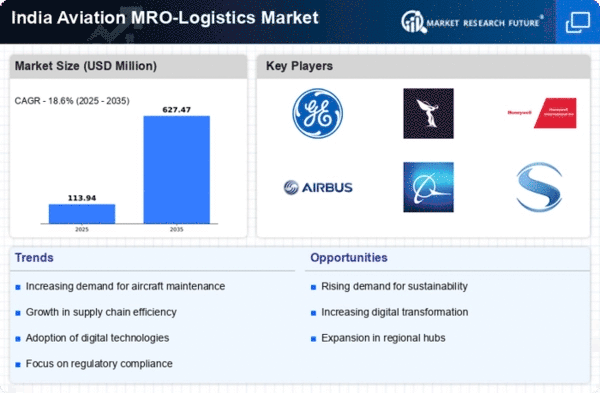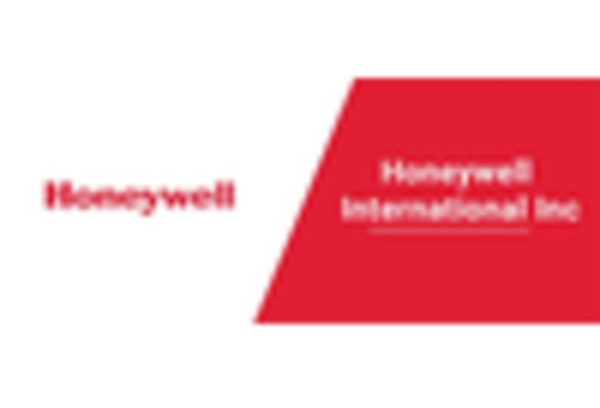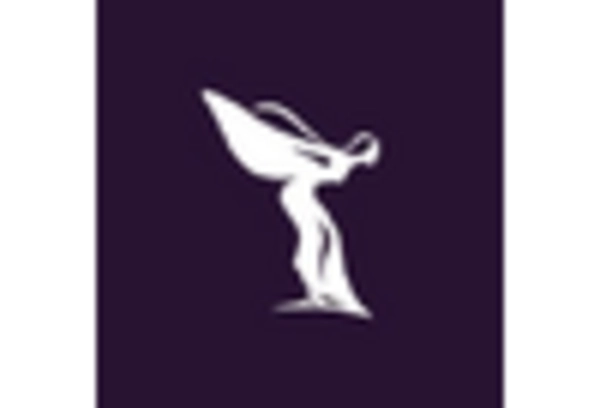Expansion of Aircraft Fleet
The expansion of the aircraft fleet in India is a critical driver for the aviation mro-logistics market. With airlines continuously adding new aircraft to meet rising passenger demand, the need for comprehensive mro services becomes increasingly vital. The Indian aviation sector is projected to add over 1,000 new aircraft by 2035, according to industry estimates. This expansion necessitates a robust logistics framework to support maintenance and repair activities. As the fleet grows, so does the complexity of logistics operations, creating opportunities for mro service providers to enhance their offerings. The aviation mro-logistics market is likely to benefit from this fleet expansion, as airlines seek reliable partners for their maintenance needs.
Increasing Air Traffic Demand
The aviation mro-logistics market in India is experiencing a surge in demand due to the increasing air traffic. With the rise in disposable incomes and a growing middle class, more individuals are opting for air travel. According to the Ministry of Civil Aviation, passenger traffic is projected to reach 500 million by 2030. This growth necessitates enhanced maintenance, repair, and overhaul services, thereby driving the aviation mro-logistics market. Airlines are compelled to ensure aircraft availability and safety, leading to increased investments in mro-logistics. The need for efficient logistics solutions to manage spare parts and maintenance schedules is paramount, indicating a robust growth trajectory for the market.
Emergence of Private Players in MRO
The emergence of private players in the aviation mro-logistics market is reshaping the competitive landscape. Traditionally dominated by public sector entities, the market is witnessing an influx of private companies offering innovative mro solutions. This shift is driven by the need for specialized services and improved efficiency. Private players are often more agile and can adapt quickly to market demands, providing tailored logistics solutions. As competition intensifies, it is expected that service quality will improve, benefiting airlines and ultimately passengers. The presence of private entities in the aviation mro-logistics market indicates a dynamic environment, fostering growth and innovation.
Regulatory Compliance and Safety Standards
The aviation mro-logistics market is significantly influenced by stringent regulatory compliance and safety standards imposed by the Directorate General of Civil Aviation (DGCA) in India. These regulations mandate regular maintenance and inspections of aircraft, which in turn drives the demand for mro-logistics services. Compliance with safety standards is non-negotiable, as it ensures the safety of passengers and crew. The aviation sector's commitment to maintaining high safety standards necessitates a reliable mro-logistics framework, which is expected to grow in complexity and scale. As regulations evolve, the market must adapt, potentially leading to increased investments in advanced logistics solutions.
Technological Advancements in MRO Services
Technological advancements are reshaping the aviation mro-logistics market in India. The integration of digital technologies such as predictive maintenance, artificial intelligence, and blockchain is enhancing operational efficiency. These technologies facilitate real-time monitoring of aircraft conditions, enabling timely maintenance interventions. The market is witnessing a shift towards data-driven decision-making, which is likely to reduce downtime and optimize logistics processes. As airlines and mro providers adopt these innovations, the demand for sophisticated logistics solutions is expected to rise. This trend indicates a potential for growth in the aviation mro-logistics market, as stakeholders seek to leverage technology for competitive advantage.
















